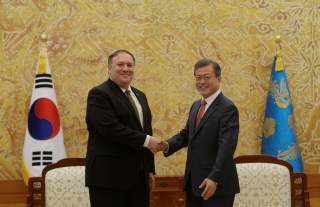The Hanoi Summit – We Asked Malcolm Davis What Happens Next in U.S.-North Korea Relations
"If diplomacy goes forward – and that’s a big ‘if’ – it has to be at a lower level and focus on smaller steps than an all-or-nothing grand deal."
Editor’s Note: Looking for more opinions on where we go after the Hanoi summit? Check out all 80 expert takes on where U.S-North Korea relations go next here.
At the most fundamental level, the Hanoi Summit between President Trump and Kim Jong-un failed because North Korea is not going to denuclearize. For the Trump Administration, denuclearisation is not optional, and sanctions cannot be lifted for anything less.
Now new concerns have emerged about North Korea restoring its Sohae launch facility—supposedly dismantled as a goodwill gesture towards diplomacy. These disturbing developments reinforce the reality that all the steps taken so far by North Korea towards denuclearisation are cosmetic and easily reversible rather than substantive.
There is little point to North Korea’s actions at Sohae unless Pyongyang is planning to launch something—either a space launch vehicle (which can also test intercontinental ballistic missile technology) or a dedicated ballistic missile test. That’s a worrying sign.
North Korea wants all sanctions lifted, and a peace treaty. The United States shouldn’t give them something for nothing. Pyongyang’s definition of “denuclearisation” is focused on removing U.S. nuclear capability around the Korean Peninsula first—and there’s no guarantee that Pyongyang would then denuclearize.
If diplomacy goes forward—and that’s a big “if”—it has to be at a lower level and focus on smaller steps than an all-or-nothing grand deal.
Post-Hanoi, the next step in diplomacy might be a full declaration of North Korea’s nuclear weapons, ballistic missiles and facilities, and IAEA inspections for verification. In return, America could offer an easing of sanctions, and possibly a peace treaty that is de-linked from the presence of U.S. forces in Korea, which would remain in place. American extended nuclear deterrence security guarantees to Japan and South Korea should be strengthened so long as North Korea has nuclear weapons. The United States also has to think about China’s challenge to Japan—and the threat from Russia.
The easing of sanctions and a peace treaty could see managed investment into North Korea that is tightly controlled to prevent it from subsidizing the growth of North Korea’s nuclear arsenal. As part of that investment, North Korea would have to agree to open up its society to the outside world. If Pyongyang really is sincere about wanting to reform its economy, it should see Vietnam as a model.
If however North Korea breaks its moratorium on ballistic missile testing, or worse, does another nuclear test, then diplomacy will collapse, and all bets are off. The likelihood is a quick return to tensions comparable to 2017’s “Fire and Fury” slide towards war.
Malcolm Davis is a Senior Analyst at the Australian Strategic Policy Institute. Prior to this he was a Post-Doctoral Research Fellow in China-Western Relations at Bond University and served in the Australian Department of Defence. You can follow him on Twitter at @Dr_M_Davis.
Image: Reuters

